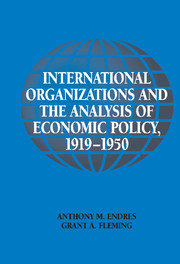Book contents
- Frontmatter
- Contents
- List of Figures and Tables
- List of Abbreviations
- Preface
- 1 Economics and Policy in International Organizations: Introduction
- 2 Business Cycles: Conceptions, Causes, and Implications
- 3 The Role and Conduct of Monetary Policy in the 1920s and 1930s
- 4 Public Investment Programs in the Interwar Period: Pre-Keynesian, Proto-Keynesian, and Keynesian Perspectives
- 5 Trade Policy Research: Geneva Doctrine and the Scandinavian Connection
- 6 Social Economics at the ILO: Scope, Content, and Significance
- 7 International Finance and Exchange Rate Policy
- 8 The Full Employment Movement from the 1940s
- 9 Conclusion
- References
- Index
3 - The Role and Conduct of Monetary Policy in the 1920s and 1930s
Published online by Cambridge University Press: 29 July 2009
- Frontmatter
- Contents
- List of Figures and Tables
- List of Abbreviations
- Preface
- 1 Economics and Policy in International Organizations: Introduction
- 2 Business Cycles: Conceptions, Causes, and Implications
- 3 The Role and Conduct of Monetary Policy in the 1920s and 1930s
- 4 Public Investment Programs in the Interwar Period: Pre-Keynesian, Proto-Keynesian, and Keynesian Perspectives
- 5 Trade Policy Research: Geneva Doctrine and the Scandinavian Connection
- 6 Social Economics at the ILO: Scope, Content, and Significance
- 7 International Finance and Exchange Rate Policy
- 8 The Full Employment Movement from the 1940s
- 9 Conclusion
- References
- Index
Summary
DOCTRINAL SUPPORT FOR INTERNATIONAL ECONOMIC CONFERENCES IN THE EARLY 1920s
In the monetary field a great deal of preparatory work was completed at the LON in the early 1920s to establish a framework of ideas concerning postwar monetary reconstruction. In addition, economists in international organizations attempted to articulate some principles that might act as focal points for general international monetary cooperation. The ultimate purpose of cooperation was to counteract the international transmission of business cycles. Two conferences were convoked by the LON: The Brussels Financial Conference in 1920 gave initial impetus to the preparatory work on monetary issues; a clear, formal expression of principles was arrived at in 1922 at the Genoa International Economic Conference.
The Genoa conference provides a leading example of the rationale for international organizations such as the LON in the 1920s as noted in our first chapter. Such organizations can develop principles on which economic policies are formed and executed in the interest of international peace and progress. Given that international monetary arrangements were in disarray in the early 1920s following the breakdown of the pre-1914 gold standard, monetary policy and exchange rate issues came to the fore. The conference emphasized exchange rate stabilization through currency reform, making all currencies exchangeable against gold. Rather than gold acting as a means of settlement or as an international monetary reserve, currencies firmly on the gold standard (the U.S. dollar and eventually sterling) were to act as reserve currencies.
- Type
- Chapter
- Information
- Publisher: Cambridge University PressPrint publication year: 2002



